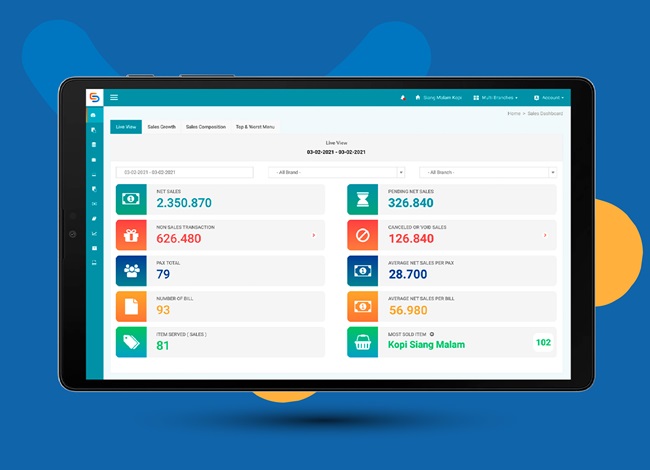 SHARE
SHARE
Enhance Your Culinary Business Operations with Integration Systems
Rizki Amelia
Business players widely implement integration systems, especially in the culinary field. These systems help develop a business by making transactions, data management, and other business operations easier.
If you’re still confused, this article will explain what an integration system is, the components to pay attention to, and the benefits of using such a system in your business.
Business Integration Systems
A business integration system combines various components of information technology, such as software, hardware, databases, applications, and services, to work together and interconnect. The goal of this system in your business is to ensure that various systems within the organization can communicate and share data smoothly, resulting in more efficient and coordinated business processes.
Important Components in Business Integration Systems

Source: Freepik.com
According to oyova.com, there are important components that support business integration systems: Enterprise Resource Planning (ERP), Customer Relationship Management (CRM), and Human Resource Management (HRM). Each of these components plays a vital role. Here’s what they do:
- Enterprise Resource Planning (ERP): The ERP system is the backbone for accounting, procurement, and project management systems.
- Customer Relationship Management (CRM): The CRM system enhances customer engagement by centralizing customer interactions and data into a single repository.
- Supply Chain Management (SCM): The SCM system optimizes supply management, from storage to logistics.
- Human Resource Management (HRM): The HRM system facilitates human resource tasks, such as recruitment, payroll, and performance management.
Also Read: What is ERP & How Does ERP Reduce Business Costs by Up to 35%?
Benefits of Integration Systems for Your Business
If you own an MSME or a culinary business, you might wonder if there are benefits from this integration system for your sustainability. The answer is yes! Here are the benefits:
1. Clear and Directed Business Planning
You can focus more on creating a directed plan, giving your business clear objectives. You’ll find it easier to run your business cycle and scale up in the future. Why can you manage this easily? Because you have planned and integrated complex business processes well.
2. Improved Quality
By implementing this system, the quality of your business will increase, enhancing its value. If every division in your business maintains high quality, the improvement in your overall business quality will be evident, thanks to integration in areas like supply of raw materials, production efficiency, distribution, service, and more.
3. Optimizing Business Resources
You can optimize the resources in your business. For example, if your business inputs raw material data, your employees won’t need to do this manually. All data will be interconnected, making tasks more efficient. With this integration system, your resources can work optimally, maintaining productivity, scalability, and performance.
4. Easier Decision-Making
Making sound decisions is a crucial element supporting a company’s sustainability. In decision-making, you need to consider both external and internal factors. The role of data within business integration is essential as it serves as a reference point for stakeholders and others to quickly and accurately obtain information.
That’s a brief explanation of integration systems for your business. Essentially, this system will help your business grow and potentially become profitable in the future.
How Does Integration Help Your Business?

Source: ESB Documentation
The advantages of using an integration system in your business include efficient operations, cost savings, prevention of errors during data entry, improved service, enhanced collaboration among businesses, and increased flexibility in responding to customers. This will boost your business's productivity and profitability.
If your business operates in the culinary field, you can use the widely used ERP software for restaurants, such as ESB Core. This ERP software comes with comprehensive features like inventory management, business journals, and detailed sales reports. ESB Core is also designed to make it easy for culinary entrepreneurs to manage their restaurants effortlessly.
 SHARE
SHARE

